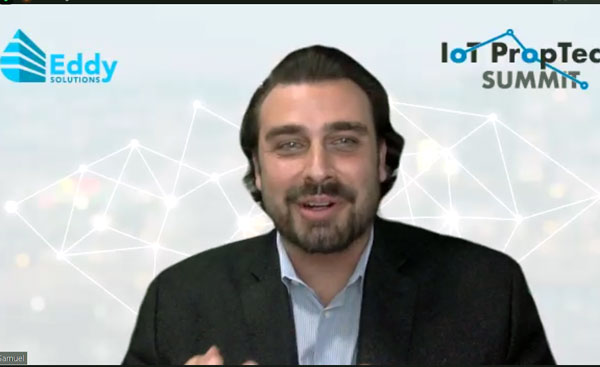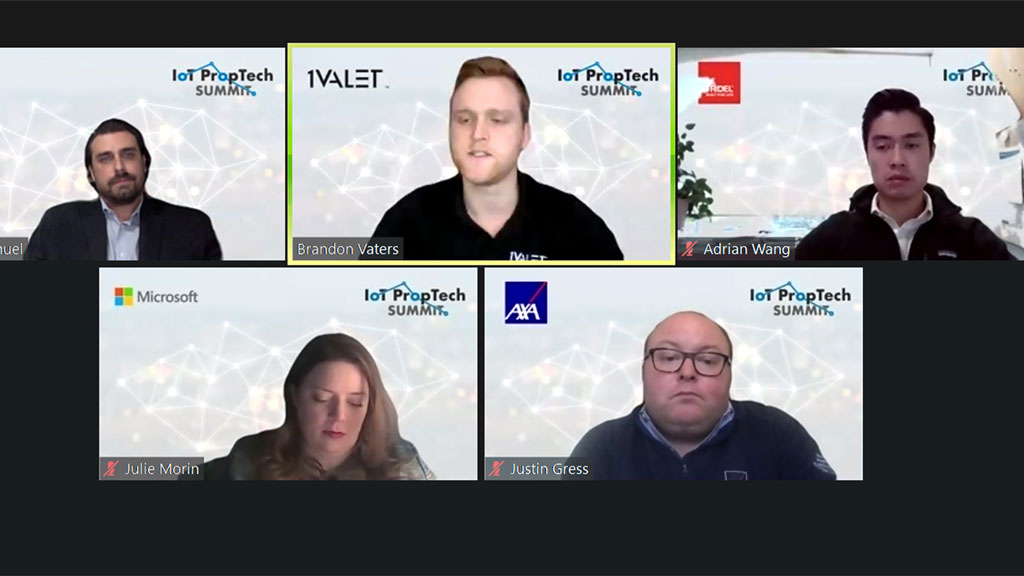The burgeoning proptech sector is getting more sophisticated by the month but in the end, developers and builders still tend to return to one elemental question: what is the return on investment?
ROI was indeed a dominant theme during a recent panel discussion held Nov. 19 as part of the online IoT PropTech Summit presented by Eddy Solutions and PCL. The webinar was billed as Tales from the Front Line; Julie Morin, director of IoT solutions for smart infrastructure at Microsoft, served as moderator.
The four panellists were Brandon Vaters, vice-president of operations at 1VALET; Elliott Samuel, senior director of proptech at Eddy Solutions; Adrian Wang, director of innovation and sustainability at Tridel; and Justin Gress, director of strategic operations with AXA XL.
“Two questions we’re often asked – will it help us sell or rent out units for more, and how will this technology reduce our operation’s costs?” Vaters said.
Sometimes the ROI value of a proptech investment is easy to grasp, Samuel explained. With monitoring systems such as his firm’s data-driven, IoT-enabled water-leak prevention technology, all it takes is one disaster averted to prove the value of an investment.
“One key is having correct points in place so you can correct data and see things that people aren’t seeing on site,” he said.
“Small lines coming out of a mechanical penthouse where we see significant losses, 80 to 90 litres a minute, we are able to catch and stop those in 30 seconds, whereas traditionally those types of losses would be hundreds of thousands in terms of damage.
“So, a lot of benefit to be gleaned in terms of investment.”
Wang linked construction management software to the proptech discussion.
“We have implemented a number of construction technologies in this space that have resulted in very direct risk-management reduction and resource savings,” he said, mentioning a tool that helps trades and field staff communicate better. A survey found a significant boost in information exchange.
“That was a validation of this construction management tool,” said Wang. “I am talking about people who still use flip phones or people who haven’t launched into this full force…And that was a validation that we are on the right path here, that people believe in this and it is enhancing productivity onsite so that was a great win for us.”
Vaters described his firm’s 1Valet system, which incorporates and integrates such functions as Smart Entry System, Mobile Resident App, Smart Community, High-Touch Concierge Service, Building Controls, In-Suite Connectivity and Parcel Scanning. The most important issue for buyers is ROI, he said.
One criterion that tends to tip the scales is whether the products are future-proof, Vaters said, and in this context it’s better to have a product that is software-based, not hardware-based. Hardware installed early on during construction might be obsolete when tenants are moving in but software can evolve.
“This allows properties to keep pace with changing technology,” he said. ‘We are often educating developers and property managers in this area given how slow the industry is to adopt this technology.”
Also of major importance is how well various products mesh together — whether they can easily be monitored, a concept referred to several times during the conference as whether there is “one pane of glass” (computer screen) needed or several.
“We find simplifying these complex systems is absolutely critical, especially with the high turnover ratio within the concierge and the property manager positions,” Vaters said.
Tridel’s Wang expanded on the point.
“When you look at Google Home, it really transforms the space by fundamentally changing the way people engage with that technology by providing a very seamless integration via voice command or biometrics,” he said. “It revolutionizes that space because people are much more willing to adopt that technology.
“Technology needs to be seamless or invisible to the user. Ideally you want to be able to identify with what the user is struggling with, what the pain points are and resolve that issue while staying in the background.”
Gress suggested buyers look for firms that have a track record and also start small with an investment, perhaps undertaking a pilot project.
“You don’t have to make a huge investment in all cases to get that experience,” he said. “From an ROI perspective, you might be able to do so in a more limited way and experiment.”
In the end, Vaters said, one of the strongest arguments for loading up on proptech is that homebuyers today are demanding it. It creates more value.
“It does give a competitive advantage,” he said. “What residents are asking for is a consolidated experience.”




Recent Comments
comments for this post are closed